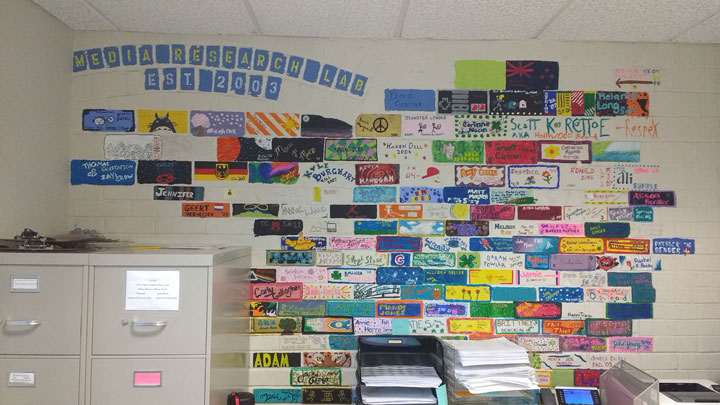As a PhD-Candidate, you sometimes get amazing opportunities to work together with international colleagues. Under the guise of personal development, I recently had the privilege to spend eight weeks in the United States of America to collaborate with Douglas Gentile and his Media Research Lab at Iowa State University in Ames.
A change of scenery can do a lot for your perspective. You start noticing all the things you usually take for granted, and how subtle cultural differences can have a big impact on atmosphere. One thing that stood out to me at the Media Research Lab group was the degree to which all students, both graduate and undergraduate, are included in the research on all levels. There seemed to be a high degree of freedom and autonomy for students to research own questions, which motivated them to put in their best efforts. The most telling examples of this would be the phenomenon they called ‘the Wall’. Everyone who has worked or studied in the Media Research Lab can leave a permanent mark by painting one of the bricks in the main lab space. In this way, you are constantly surrounded by the colorful work of fellow students, colleagues and supervisors when sitting in the lab. A funny and cute way to really make you feel like you belong.

Part of ‘The Wall’ at the Media Research Lab in ISU. Notice the awesome orange brick with the Dutch flag on the left.
It was no accident that I ended up at Iowa State University for a stay. I’ve admired the work of Douglas Gentile ever since I came across his paper on the Multiple Dimensions of Video Game Effects. In this overview, Gentile argues that video games can affect players through at least five different dimensions, namely the amount, content, context, structure, and mechanics. This means that even the same game can have a multitude of social, cognitive and emotional influences on players, depending on each particular dimension. This idea should be clear to anyone who has experienced the wide array of (often conflicting) emotions a single video game can cause. During one match of online competition, players can cycle through feelings of frustration, elation, camaraderie and disappointment in the span of mere minutes. Being aware of this diverse range of effects is necessary to fully understand the impact of video games on youth. Furthermore, it suggests that we should always be measuring game effects beyond just the number of hours spent gaming. In my opinion, research on normative game effects still focuses too much on the relation between time spent playing games and wellbeing. The next step that researchers should take is investigate what exactly is happening during those hours behind a screen.
The Media Research Lab often works together with the ISU Center for Study on Violence, led by Craig Anderson. Research emerging from this collaboration focuses on the relation between violence in games and aggression. At first glance, evidence for a relation between violent games and aggression seems to be in stark contrast with the GEMH lab mission to use games as a tool for promoting mental health. Yet, I always feel that there is a comforting underlying message here. Research on violent media has shown that there can be long-lasting effects of exposure to certain video games. While violent games might increases aggression, this relationship would work similarly for games with other types of content. Indeed, it has repeatedly been shown that games with prosocial content or cooperation mechanics actually decrease aggression and increase prosocial behavior. For me, this is one of the most important nuances to keep in mind while doing research. Video games can change social behavior for the worse or the better. A problem arises when the ‘overall’ effect of video games gets polarized as either ‘good’ or ‘bad’. Dichotomizing the impact of games as positive or negative is futile, since this depends on the dimensions of each individual game. All we can say is that, yes, video games do have an impact on the player. Now it is up to researchers, game developers, parents and players to harness and emphasize their beneficial influences.




